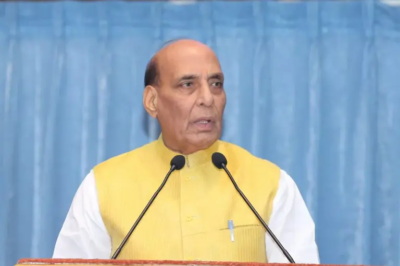
Summary
- Defence Minister Rajnath Singh highlights the need for India to adopt inclusive, sustainable, and ecologically sound development models.
- Recognizes poet Sugathakumari’s contributions to environmental activism, especially in the ‘Save Silent Valley’ movement.
- Emphasizes India’s commitment to climate justice and long-term sustainability through green initiatives.
Why Should India Prioritize Sustainability Over Rapid Development?
Speaking at the 90th birth anniversary celebration of Sugathakumari, one of Kerala’s most revered poets and environmentalists, Defence Minister Rajnath Singh stressed the critical balance between development and ecological preservation. He argued that true progress must prioritize the health of our planet, advocating for responsible consumption driven by need rather than greed. Singh called for a departure from the ‘use-and-dispose’ culture, urging the nation to adopt a more sustainable approach to resource management.
Sugathakumari’s legacy as an environmental advocate resonated deeply throughout the event. Describing her as a “conscience-keeper” of society, Singh lauded her poetic contributions and environmental efforts, particularly her pivotal role in the historic ‘Save Silent Valley’ movement. He underscored her unique blend of humanist sensitivity and moral foresight as a guiding light for contemporary society.
The Path Toward Sustainable Growth
India’s environmental commitment is evident, Singh noted, referencing the nation’s steadily increasing forest and tree cover highlighted in the recent ‘India State of Forest Report.’ While historically contributing minimally to global warming, India is actively working to mitigate climate change effects. Singh spoke about the constitutional responsibility of citizens to protect the environment, emphasizing humanity’s role as caretakers, not exploiters, of natural resources.
The minister also addressed the growing global climate crisis, noting the increasing occurrence of extreme weather events like heatwaves, droughts, and floods. He called for a collective approach, involving corporate policies and individual actions, to combat these challenges. By 2047, India aims to emerge as a developed nation through green initiatives and a focus on climate justice.
Conclusion
Rajnath Singh’s speech at Sugathakumari’s commemoration highlighted the interconnectedness of human progress and environmental stewardship. By drawing attention to India’s constitutional duties, the minister reminded the nation of its deep-rooted respect for nature. In celebrating Sugathakumari’s contributions and championing sustainable growth, Singh’s message offers a powerful blueprint for inclusive development that prioritizes the planet’s well-being.









































Leave a Reply